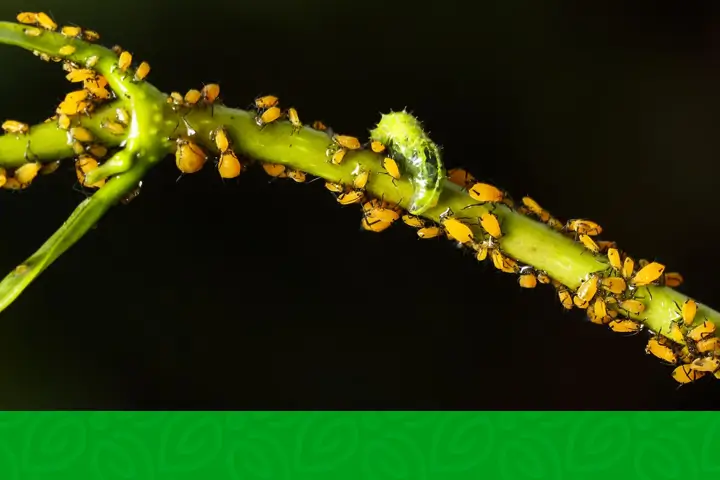
In the intricate dance of agriculture, farmers are no strangers to adversity. From unpredictable weather patterns to relentless pests, their battle for bountiful harvests is ongoing. Among these adversaries, aphids stand out as formidable foes, known to wreak havoc on crops, leading to reduced yields and financial losses. However, in recent years, a revolutionary approach has emerged in the realm of agriculture—a ray of hope for farmers battling aphids. Enter aphid-resistant crop varieties, the game-changing solution that promises to turn the tide in favor of struggling farmers.
The Battle Against Aphids: A Brief Overview:
Aphids, those minuscule sap-sucking insects, have been the bane of farmers for centuries. Their voracious appetite for plant sap, ability to reproduce at an astonishing rate, and capacity to transmit plant diseases have made them a formidable pest. For years, farmers have resorted to chemical pesticides to combat these tiny invaders, but their efficacy has waned due to aphids’ ability to develop resistance over time.
The Dawn of Aphid-Resistant Crops:
In the ever-evolving world of agriculture, science has come to the rescue. Researchers and breeders have tirelessly worked to develop crop varieties that possess a remarkable resistance to aphids. These innovative varieties exhibit traits that deter aphid infestations and reduce the need for chemical interventions, offering a sustainable and eco-friendly approach to pest management.
How Aphid Resistance Works:
Aphid resistance in crops can manifest in various ingenious ways, harnessing the power of natural defense mechanisms. Some crop varieties release chemical compounds that deter aphids from settling on their leaves or feeding on their sap. Think of these compounds as invisible shields that keep aphids at bay. Others produce sticky substances that trap aphids upon contact, preventing them from causing harm to the plant. Imagine it as a natural adhesive that keeps unwanted guests from causing damage. Additionally, certain crops have been bred to exhibit rapid growth, which allows them to outpace aphid damage. It’s like a race where the crop wins every time.
Prominent Aphid-Resistant Crops:
Farmers eager to embrace this agricultural revolution can choose from a variety of aphid-resistant crops, each with its unique set of superpowers. Let’s take a closer look at some of these crop types:
- Wheat: Wheat, a staple in many diets, has been fortified with aphid resistance genes. These genes send signals to aphids, warning them to steer clear. As a result, wheat crops can thrive without the constant threat of aphid infestations.
- Barley: Barley, another cereal crop essential for various food products, has also benefited from aphid resistance breeding. By naturally discouraging aphids from feasting on their leaves and grains, barley plants remain robust and productive.
- Soybeans: The versatile soybean, a valuable source of protein and oil, is now available in aphid-resistant varieties. These soybeans deter aphids through their natural defenses, reducing the need for chemical treatments and boosting overall yield.
- Canola: Canola, the source of valuable cooking oil, has not been left out of the aphid resistance movement. With these enhanced varieties, canola plants can flourish without falling prey to aphid attacks, resulting in healthier and more abundant harvests.
Benefits Beyond Pest Resistance:
The advantages of aphid-resistant crop varieties extend far beyond aphid control alone. Farmers who adopt these varieties often witness increased yields, reduced reliance on chemical pesticides, and decreased production costs. These crops promote sustainable farming practices while safeguarding the environment from harmful chemical residues.
Aphid Resistance and Climate Resilience:
In a world grappling with climate change, aphid-resistant crop varieties offer an additional layer of protection. Climate fluctuations can alter aphid populations and behavior. By planting resistant varieties, farmers bolster their crops’ resilience in the face of evolving environmental challenges. These crops aren’t just aphid-resistant; they are climate-ready, helping farmers adapt to an ever-changing world.
The Road Ahead:
As technology and research continue to advance, the future of aphid-resistant crop varieties looks brighter than ever. Scientists are exploring genetic engineering techniques to enhance aphid resistance further and broaden the range of crops that benefit from this trait. The synergy between traditional breeding methods and cutting-edge biotechnology promises to usher in an era of sustainable agriculture, where pest-resistant crops are the norm rather than the exception.
A Hopeful Future for Farmers:
Aphid-resistant crop varieties represent a beacon of hope for farmers burdened by the relentless onslaught of these tiny yet destructive pests. By harnessing the power of natural resistance mechanisms and innovative breeding techniques, farmers can achieve greater crop health, increased yields, and a more sustainable agricultural future. Aphids may have once been the nemesis of farmers, but with these resistant varieties, the balance is shifting, putting control back into the hands of those who feed the world. Embracing aphid-resistant crops isn’t just a choice; it’s a game-changing decision that empowers farmers and secures a brighter future for agriculture. It’s a future where aphids are no longer the rulers of the field, and farmers can reap the rewards of resilient and thriving crops.
Stay updated with the latest farming tips and agriculture industry news from Africa by subscribing to our newsletter. Don’t miss out on valuable insights and updates. Follow us on Twitter, LinkedIn, and Facebook to join our farming community and stay connected with us.



















